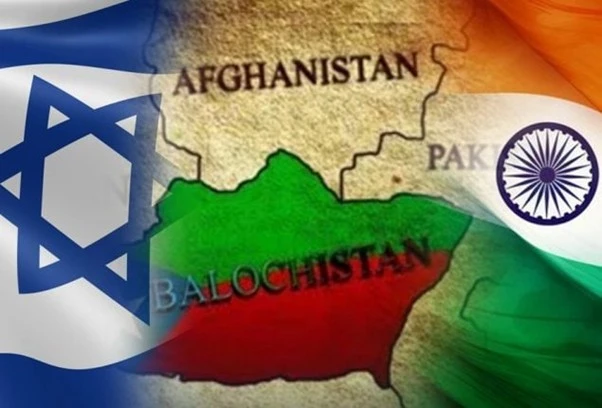On June 12, 2025, the Middle East Media Research Institute (MEMRI), a Washington-based think-tank founded by former Israeli intelligence officer Yigal Carmon, declared the initiation of its latest project: a study of Balochistan, titled the “Balochistan Studies Project.” As alleged, the project was academic research concerning the region headed by a person named Mir Yar Baloch, who was the Special Advisor. Though the title and affiliation may give a feel of the legitimacy of the paper, whatever lies beneath the surface proves far otherwise where a devious agenda exists within the framework of hybrid warfare, disinformation and geopolitical meddling.
Mir Yar Baloch is not a representative of Baloch people. Instead, he is broadly known to be a proponent to the Balochistan Liberation Army (BLA), a terrorist organization that has caused many attacks in Pakistan. The vehemently anti-Pakistan peddling of his digital self is notable, with the conspicuous pro-India slants that tend to chorus the India Research and Analysis Wing (RAW) propaganda message. This character is not infamous because he has been a proponent of positive change or enlightenment, but also because he has been in the thick of things promoting a divisive agenda to favour foreign interests. As a matter of fact, Mir Yar Baloch does not seem like a human but a computerized person, more of a propaganda weapon as posing as a voice of the Baloch.
The induction of such a polarizing and controversial personality to an academic endeavour, which was supposedly destined to the study of Balochistan is a matter to consider. What is the reason to have someone who openly expresses his ideologies, and who is driven by the politics to become an advisor to a think tank that purports to be research-oriented and regionally oriented? The solution is within itself and the genesis of MEMRI. Instead of being an impartial journalist outfit, MEMRI was established by people, who were close to intelligence and ideological anti Mu- slave centres, particularly Pakistan. It has also over the years especially become infamous with the selective reporting of news materials in ways that advance messages that are convenient to US and Israeli strategic interests mostly at the cost of truth and balance.
Through the initiative of the Balochistan Studies Project, MEMRI seems to be militarizing academic arenas to advance its own agenda, which coincides too well with the goals of the elements that want to destabilize Pakistan. Offering a platform to such individuals as “Mir Yar Baloch,” who openly espouse separatism and parade false grievances, the think tank has demonstrated that it is not a research institute, but an actor in the information sphere of hybrid warfare.
Hybrid war is no longer something of the future; it is the nature of contemporary conflicts experienced in the world. The fighting field in this kind of war does not only consist of mountains and borders, but there is also a digital network, media platforms and psychological operations. It is not the aim to take control through military means, but to separate through the inside, to undermine confidence in organizations, to set villages and communities against one another and to manipulate reality to create a problematic country. The operations of MEMRI and the promotion of leaders such as Mir Yar Baloch is the perfect illustration of this new pattern of fighting in the modern war.
The pushing narrative is well crafted: to present Pakistan as disjointed, non-just and failing especially in how it treats the Baloch people. Politics overlooks the ground reality, but this is the story. Balochistan is the place, where people, although being exposed to the genuine socio-economic pressure, have time and again proved their adherence to the integrity of Pakistan and the sovereignty of Pakistan. The government on its part has done its level best to champion the concerns of the region by carrying out developments in the region, political participation, and inclusive policies. The way forward is through dialogue, infrastructure, education and economic opportunity rather than foreign-led discontent and bloodshed.
Balochistan is not represented by the BLA and its online trolls such as Mir Yar Baloch. The latter are merely a fringe, which is highly backed by foreign groups who find it in their interest to have Pakistan destabilized especially on a long-term basis. These actors do not seek to annul problems but to create disaster using their platform such as MEMRI to give them international legitimacy. They make use of legal grievances to achieve non-legitimate objectives, which they turn into crises and unite into division.
It is imperative to separate the well-meaning criticism that is necessary in any democratic set up and the foreign-sponsored sedition. Such hybrid threats must be guarded against by Pakistanis. Digital war is not any less than any other type of war, and the effects of such could also be just as devastating. This is not a war of bombs but a war of hearts and mind, a war of the narrative and the identity of a nation.
The Balochistan Studies Project that has been launched in the name of academic studies is a Trojan horse of a bigger game of hybrid war. Mir Yar Baloch is more than an independent voice and rather than intelligent expression is a metaphor to this larger policy i.e. an unnatural creation intended to play on perceptions and splinter national unity. Pakistan as a country should not only discredit these narratives with the hard reality, but it should identify the networks spreading these narratives. The power of the Pakistani state is based on the capacity to bind people together, protect its national sovereignty and oppose the foreign arm-twisters, passing as patriots. Awareness is the first step of the battle towards truth and truth starts with unmasking the puppets of this digital war.








